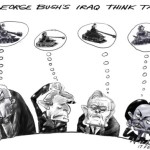Anyone who is well versed in political literature knows that studies from think-tank organizations are often referenced for their research by news media and public policy makers. I can hardly blame them. Think-tanks are very direct with their research. They have a point and they make it using known credible research methods.
Their work is much easier to understand than most academic journal publications, and most have blogs which summarize conducted research and warp them into opinion. These opinions are usually easy to follow and understand, and most of the time they end up featured in the opinion or comment section of a mainstream newspaper like The Washington Post, New York Times, or Huffington Post.
Yes, think-tanks are great in those respects but there is reasonable doubt about their credibility. Like all other institutions and human beings, think-tanks have their own agenda. They set out their research in order to make their point. They are also funded by people with specific interests like the state or private individuals or companies.
Think-tanks are also known to have political affiliations and bias. If the research goes their way, it will be featured and publicly disclosed. It would be rare to find the liberal-leaning Economic Policy Institute (EPI) arguing against federalized health care and for deregulation on Wall Street. The same could be said for the libertarian-leaning Cato Institute, you would never find their work bashing the free market and pointing out some of its known failures. What is most interesting however, is that if you ask either institution, the Cato and EPI, about things like raising the minimum wage, consumer protection, the Federal Reserve, and income inequality, you almost always get reasonably researched topics pointing to different answers.
When I examine think-tank publications, I try and look at the research methods and how conclusions are drawn from what data. This is quite possibly the most important factor to consider before accepting the conclusion as a known fact. Just because an institution has a known conservative or liberal bias, does not necessarily mean that their research is fabricated. There may, in fact, be a lot of truth to their claims.
The second most important thing to consider is the focus of the research topic. Free trade is a good example of this because if you examine the outcome of outsourcing jobs and lower tariffs from the perspective of a low-skilled worker in a manufacturing plant, the research would show they would be much worse off. If you look at free-trade from the perspective of the consumer, they would be getting the better deal. (This example is very generalized.)
Despite the rational reasons to be skeptical of think-tank publications, keep in mind that all institutions and individuals have their own political biases. Making policy decisions based on a small handful of these methods and groups is dangerous because, as stated before, the topic is only focused on a particular goal or organization affected. In order to build effective and positive policies, one should look at how it affects everyone by examining multiple sources of information on any given topic. Think-tanks, individuals, and single organizations on their own do not operate like that.
Nazzy S. is the blogger at The Classy Geek. Twitter @NazzyTheGreat
[This article was originally published in The Classy Geek.]
